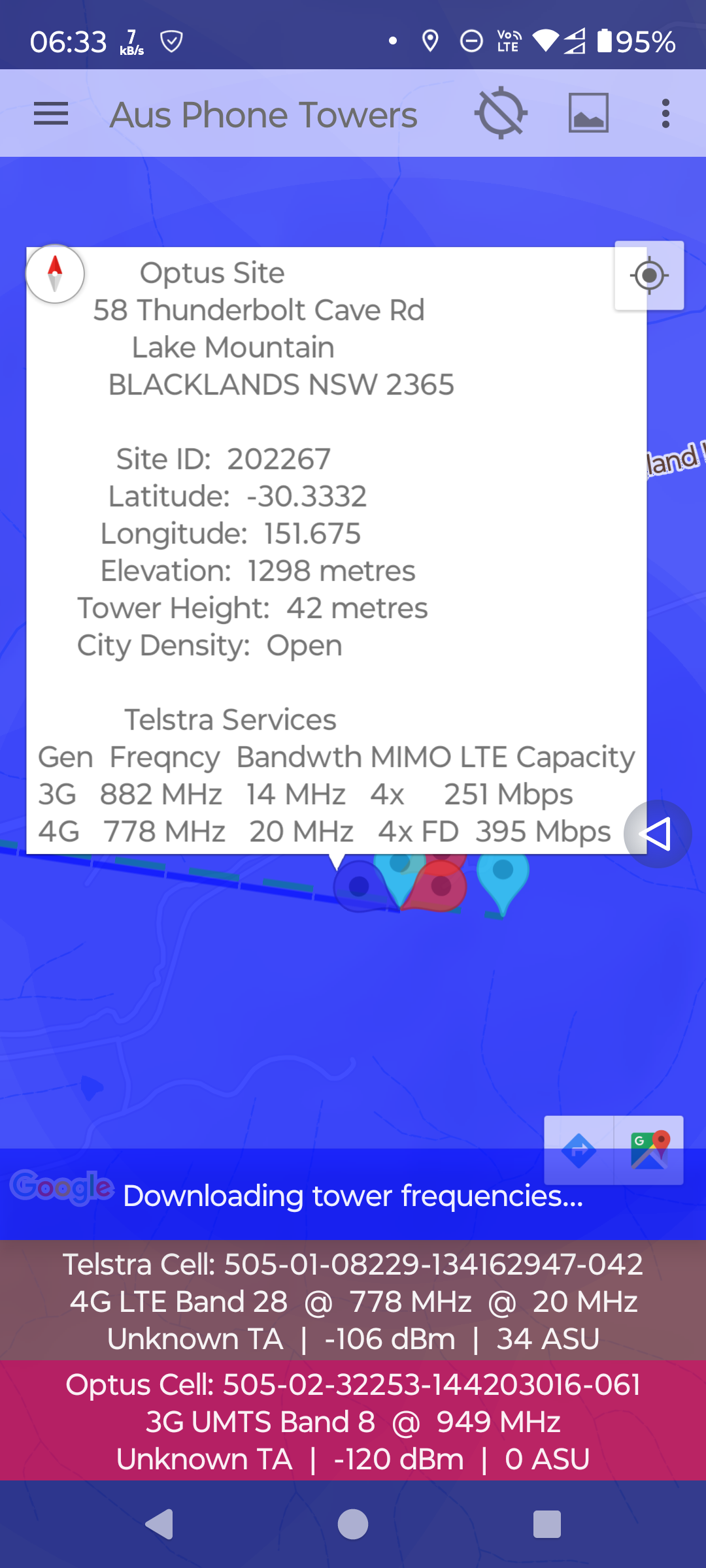Why do cell phones have a data limit but home internet doesn’t? I understand bandwidth limits, but how can home internet get away with giving users all the data they can use, but cell phone providers can’t?
Limits on home service used to be more common, but some plans still have caps. My home internet has a cap, it is just really, really high and they charge you more for exceeding it instead of cutting off access.
My phone also has a cap, but the cap means the connection is throttled instead of charging more.
I have had a home plan in the past woth no limit, but they didn’t offer service to my new house when I moved.

For cell / mobile phones, you’re sharing the capacity of the cell among multiple people.
In this example, a rural cell tower can provide up to 395Mbps.
It would only take 40 people watching Kayo at high definition (or any high definition video service) via their phone or a 4G router to saturate this tower.
For everyone else at this time, it’ll still work but even though they might have a strong radio signal (lots of bars), the internet will become slow.
Limiting monthly usage, or charging more for more data per month, reduces the risk of saturation.
There aren’t going to be 40 people using that tower if it’s truly a rural tower. If it isn’t a rural tower then they can update it to handle more throughput. The issue isn’t the towers, it’s the companies wanting to keep using old tech to squeeze out as much profit as possible.
Both of you can be correct. The policy is prevalent to squeeze money out of consumers. However, it’s also easy to imagine more than 40 people in a rural area using their phones for media purposes during PM times in 2024. There’s less to do, internet availability might not exist for some or all residents, and people use their phone for everything now. Casting from a phone is a larger percent of viewing TV now.
In a rural area the population density is a lot less than that of suburbs or the city. We’re talking about 40 people or less using a single tower, this also takes in account of the 3 carriers. If each carriers tower can handle 40 people, that’s potentially 120 users total in a few mile radius, which is normal for rural populations.
This tower has about a 20km radius on average due to topography, covers a stretch of the New England Highway and also covers the nearby village of Black Mountain. A good few hundred phones will be in range I expect.
The tower also has cells for Optus and Vodafone, but they are a significant minority of customers in this area.
This sounds like an issue with the carriers not actually putting in more towers to properly handle the load though. Aka greed.
I pay an extra $30/mo on top of the $100/mo for comcast to not charge me extra when we shatter 1TB usage every single month (average 3.5-4TB usage in this home). They absolutely do have caps on home internet, always have, at least in my state. During the pandemic they relaxed the fees so going over didn’t cost but as soon as they could, they went right back to charging $10 per 50gb over 1TB usage with a max fee of $100. It’s bullshit but we don’t have a choice here, can’t even get satellite internet as an option because the complex doesn’t allow dish installation on the building.
It depends where you live, Here pay $45usd for unlimited 1Gb/500Mbps Fibre and it is truly unlimited (usually 15-20Tb a month) and $35usd for unlimited 5G tho it’s throttled abit after 60Gb.
Playing devil’s advocate here. A possibly legitimate reason ISPs put in data caps is wireless spectrum congestion.
Playing devil’s accountant here. A possibly legitimate reason ISPs put in data caps are shareholder dividends and capital appreciation.
- Charge more
- Provide inferior service
- Profit
It’s a self managed QOS. If the customer knows they can only use X data they’re going to be a bit more cautious about using it. Vs if they have unlimited data then they’ll just download that 50 gig file on their phone because “fuck it why not”. The less data each individual customer uses the less infrastructure they have to build, and the faster/more consistent their existing stuff will be.
Cell tower time is a LOT more expensive than time on a fiber optic cable. Your ISP installs a few boxes to serve your neighborhood, a cell carriers tower might go 20 miles.
It’s going to be precisely the reason. If you have a dedicated wire, fibre or copper then the entire available bandwidth is available per connection (one caveat with copper is crosstalk but it is minimal and can be mitigated). With fibre the available bandwidth per strand is huge.
It’s so fast that even where there’s contention, it is rarely a problem that everyone sharing a part of the connection is downloading or uploading at once. So pretty much most of the times you test, you get the full speed.
With mobile data, the entire cell is sharing a small amount (in comparison) of spectrum. Unlike a wire, the entire spectrum cannot be used by a single tower, a pretty small number of channels are carved out for them. Also because the signals are travelling through the air, there is more of a problem of signal loss and interference to contend with, so the channels very rarely reach the maximum possible speed (forward error correction and reducing bits per symbol to reach a suitable signal to noise ratio both will reduce speed for example.
For upload (which isn’t usually much of an issue) there’s another problem of guard time between timeslots. When downloading, the cell transmitter transmits the whole time and shared the channel between all users (another thing that can slow things down) so there’s no problem of needing a guard time. But when it’s separate transmitters (phones) sending there’s going to be a guard time between different handsets timeslot and the more active transmit stations there are (phones) the more these guard times add up to wasted bandwidth. Luckily most people are downloading far more than uploading, so it’s less of an issue.
I think for these reasons caps are used to limit people from ALWAYS consuming data on the cell/mobile networks and instead using wifi wherever they can in order to keep it fast for those that do/need to.
Lots of home internet does have a data cap, but you might not realize it. Typically what will happen is that, once you hit your cap, you’ll be rate throttled. That throttle might not affect most video streaming since Netflix is really good at video compression, but you’ll see the hit if you are, for instance, downloading large games from PSN, Steam, etc.
They convinced the FCC, cellular networks are different than wired, and should have different rules.
- Some home internet providers have data caps.
- Some wireless providers do not have data caps.
What you’re up against:
Home internet providers have high-speed lines that run through population centers and into every neighborhood. The backbones are fiber, so adding more capacity isn’t all that expensive. If they run a 2.5-gigabit line to your neighborhood and it gets stressed, they can upgrade the local aggregate. Wired internet has enough bandwidth to service an incredible number of people.
Wireless internet needs towers and faces challenges like exposure, interference, and balancing power so everyone doesn’t try to reach the wrong tower. Each tower has to have it’s own network backhaul to service everyone in that area. Each tower has limited bandwidth and time to slice up the connections. It’s hard and expensive to expand cellular tech.
Data caps let IPS’s handle capacity planning. Charging more for overages makes money and dissuades users from making them upgrade prematurely.
My home Internet charges extra when I use more than 1 TB per month. Not sure but I think it’s metered both up and down.
damn, I share almost a TB/day.
Hopefully only Linux ISOs /s
Nintendo roms
Wow.
How many nintendo roms are there?
switch roms range from 6-20GB each. plus SNES, full collection about 5gb.
Ah yes, switch games are not tiny small cartridges.
Gotta finish my “arcade” box-stick-raspberry one day …
5GB you say? That’s so incredibly cool actually.
I remember Comcast suddenly started enforcing a limit of about 1 TB some years ago when I had them. Realized it happened when I renewed my contract to get a lower price again for a promotional period. Apparently I agreed to a new contract or something that included the new limit. >:|
Yep sounds familiar 😅
FCC is looking into that, I think it was during Trump’s administration
I currently have that cap and wondering how I will be able to play MSFS2024 under these conditions. Absolute trash they get to enforce this.
Had the same thought, and a rep already told me I’m 200gb away. Let’s hope some of the stuff is cached.
Just try to pnpy so flights at 30k ft or above so you don’t have to load ground textures lol
If my phone didn’t have a cap, I’d hotspot it all, which is basically the idea of cellular home internet routers. I found a home router without a cap, which time will tell to be true, but it’s still more expensive than my phone with a very large but not unlimited cap.
They want to get paid, that’s the reasoning. The amount of data is really irrelevant except for pricing.
Roaming fees used to be the same until EU stepped in. Hopefully EU will eventually step in and order a full stop to ALL CAPS too. We live in the “future” now, right? Bring me my free unlimited connection so I can download that car they talked about.
Caps are fake there’s no need for them besides to build golden marble pillars outside CEOs mega mansions.
Neither my phone internet nor my home internet has a GB limit. The phone internet costs 25€ a month, and home internet 30€.
AT&T asks the same question. They provide the bold option to pay more than the competition and get data limits on your home internet.
I am lucky to have a local ISP that is amazing. I’m hoping that they never change.











